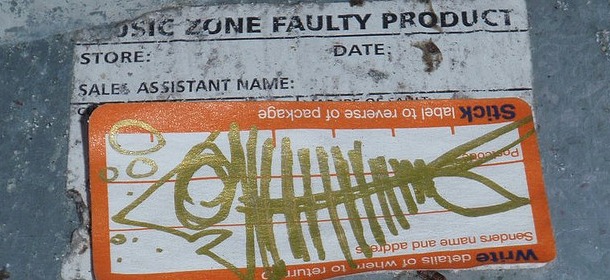Environment
GMO Salmon Near FDA Approval—Public’s Input Not Wanted
This article was originally a call to action, but that action is now too late. It was originally published in July 2010, and is reposted to inform about the dangers of GM salmon, which are now on the verge of approval. (An article on the current status will shortly be posted.)

Dead Fish on Label, by Sheila Blige
by Heidi Stevenson
As the Food and Drug Adminstration (FDA) nears approval for the first genetically engineered salmon, the public’s views on the issue are not wanted. These genetically modified organisms (GMOs) will be the first animals approved for food, but the FDA is treating them like veterinary drugs, so the approval process is not open to the public and none of the documentation is available for inspection.
The modified fish, called AquAdvantage® by their developer, AquaBounty Technologies, grow to market size very quickly. AquaBounty claims the fish can be ready for sale in 16-18 months instead of the usual 3 years for standard farmed salmon.
What We Know…
AquaBounty implanted two genes into the genetically engineered salmon. One is a growth hormone gene from Chinook salmon of the Pacific Ocean, and the other is a gene from the pout fish that turns the growth hormone gene on. These keep salmon from turning their growth hormones off when it’s cold, so they continue to grow.
The FDA’s approval process requires submission of seven data sets. The first five have been approved. AquaBounty believes the last two sets are close to approval.
Even more revealing, though, is that the FDA has been discussing whether to require labeling of the GMO salmon—which sounds very much like they’ve already decided to approve AquaBounty’s salmon. As it now stands, the FDA does not require any other GMO food to be labeled, unless it’s significantly different from its natural counterpart or contains an allergen that the natural form doesn’t. There’s a belief that the public is “confused” by being informed.
AquaBounty’s CEO, Ronald L. Stotish, tries to create the image that their purpose is to benefit humanity. He has said that the GM fish would help grow food for the world with fewer resources. Of course, it ignores the massive amount of food the fish will need to grow so fast, the land required to provide the feed for the fish, transportation for getting feed to the fish, and the use of land that might grow vegetables or grass to graze animals for far less efficient food production in the fish. With so little basis in reality on this point, it’s difficult to believe any of AquaBounty’s statements about safety, health, or environmental standards.
…And What We Don’t Know
The method used to transfer genes is not being provided to the public. If a virus was used as a vector to transfer the genes, then the potential for inducing cancer in people who eat the salmon exists. The FDA does not seem to believe that we have the right to know what gene-transfer technique is used.
Gene Transfer?
Gut bacteria, present in everyone and necessary for life, are known to exchange genes. A study by the UK’s Food Standards Agency has shown that horizontal gene transfer can occur with a single serving of food. Is this possible with AquAdvantage salmon? We don’t know, and the FDA asks us to trust them that they’ll make the right decision.
Allergens?
Do the transferred genes produce new proteins that could be allergenic in some people? Again, we have only the word of the corporation that hopes to profit from the sale that a deadly allergen isn’t created by their product.
Nutritional Quality?
The nutritional quality and taste of the GM salmon is supposedly indistinguishable from natural Atlantic salmon. That’s what AquaBounty says—but the fact is that these are not the same as wild fish. They are less mature than the fish normally eaten now. Why should we believe their claims…especially since the FDA won’t show us any documentation to back them up?
Fish Suffer?
Do the fish suffer from abnormally rapid growth? Do they suffer from their altered anatomy? We don’t know. AquaBounty, of course, says they don’t. The FDA doesn’t believe we have the right to know.
There is one fact that we do know about these fish. They’ll be factory-farmed. Fish raised in such conditions generally suffer horribly in extremely crowded conditions eating toxic food, which is then transferred to us when eaten. For years, farmed salmon have been known to be dangerously infested with dioxins, PCBs, and toxaphene, which are known as carcinogens, and several other dangerous chemicals.
Fish Sterile & Unable to Escape?
AquaBounty claims that the fish are sterile females and that they cannot escape from the fish farms. There are two clear problems with these claims. The first is the assumption that the techniques used to make the fish sterile will last. Genetic alterations have been known to reverse, so we don’t know if these salmon would necessarily be unable to breed. The claim that they can’t escape from the farms because they aren’t located near the ocean is belied by the fact that AquaBounty does not intend to raise the fish themselves. Their plan is to sell eggs to fish farms. Are we to believe that they won’t sell to a farmer because he’s located by the ocean?
We do know that farmed fish are already escaping into the wild with devastating effects on the wild salmon. Should we believe the promises of AquaBounty that their fish cannot escape and, if they do, that they cannot breed?
Peter Melcher of the UK’s Soil Association, says
Once you have bombarded an animal with other genes, the DNA is unstable, and there is no guarantee these fish will remain sterile. It poses far too great a risk to wild salmon. A fish that grows so quickly is also likely to lose some of the nutritional benefits. There is no such thing as a free salmon lunch and we will pay the price.
What we do know about these fish is terrible. What we don’t know could be even worse. But the FDA doesn’t think we have the right to know, and AquaBounty is only saying what they want us to hear.
Who Runs AquaBounty?
When trying to understand the nature of a corporation and its focus, it helps to look at who is on its board of directors. In AquaBounty’s case, it’s very revealing.
Richard J. Clothier is the Non-Executive Chairman of the Board and Chairman of the Nominations and Corporate Governance Committee. His career has put him at the head of agribusiness corporations, including Robinson plc, which makes packaging for supermarket products, and Spearhead International Ltd, which operates factory farms in several countries. Before that, he was a CEO with Dalgety plc, a now-defunct manufacturer of products sold by supermarkets. He retired recently as Group Chief Executive of PGI Group plc, an agribusiness firm involved in tea, flower, and produce production in Africa.
Other key figures with AquaBounty are former officers and executives of major multinational corporations, investment firms, medical device manufacturers, and pharmaceuticals. Stotish, the President and CEO, was previously an officer with a pharmaceutical firm involved in genetic manipulation. Elliot Entis, a board member, specializes in commercial and regulatory issues of biotech food introduction. Another board and audit committee member, Richard Huber, was a chairman and president of the giant health insurer, Aetna.
The collection of men at the helm of AquaBounty is remarkable for their connections with the worst sort of Agribusiness, Big Pharma, and multinational corporations. These are men who are practiced at the art of making money at any cost to the public and environment. It seems that they’ve found the perfect vehicle for their sort of expertise in AquaBounty.
Take note of the crossover between Big Pharma and Agribusiness. There truly is little distinction between them.
The FDA’s “Public Meeting”
The FDA will probably hold a “public meeting” of an advisory committee in early fall, supposedly for obtaining public input. It’s a standard procedure before final approval of a drug. Limited information, consisting of material supporting the product that the FDA picks is given to the public. It promises to be no more than a show. Gregory Jaffe, biotechnology project director of the Center for Science in the Public Interest, says that the public is not given adequate time to analyze the data provided.
All indications are that the FDA intends to approve GM salmon and hasn’t the slightest interest in what the public thinks of it. The FDA will do what it virtually always does: Serve its masters in Big Pharma and Agribusiness.
Tagged agribusiness, dangers of gm salmon, fda, fda gm salmon, fda salmon, genetically engineered salmon, gm fish suffer, gm food nutrition, gm food safety, gm salmon, gmo, risks of gm salmon, salmon gene transfer, unknown issues of genetic modification, unknowns genetic engineering














